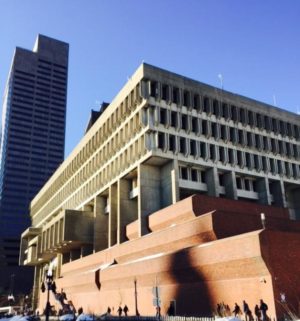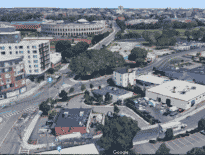At-large Boston City Councilor Michelle Wu issued a sweeping indictment of Boston’s current planning and development process this morning, and called for the destruction of the agency charged with managing it.
Wu’s call was embedded in a 72-page proposal that reviewed the Boston Planning & Development Agency’s legacy of urban renewal and spotlit specific projects she characterized as being pushed through despite neighborhood opposition. The report comes in the wake of a bribery scandal at the agency involving a Zoning Board of Appeals vote, and a proposal by City Councilor Lydia Edwards to reform the ZBA by removing real estate industry members.
“We are a city of tremendous resources, and we can chart a better path forward by leaving behind outdated structures and removing barriers to participation,” Wu said in a statement released along with the report. “Meeting our challenges with urgency and scale will require considering the interconnectedness of these issues and empowering everyone to take part. We can’t afford to maintain a complicated system that only the most privileged and powerful can navigate.”
Wu’s proposal accuses the BPDA of failing to ensure development met the city’s needs for affordable housing and efficient mass transit, specifically calling out 12 luxury multifamily buildings brought to market before 2017 and the lack of neighborhood-wide transportation planning embedded within the development process. The report also criticized the BPDA for not incorporating more rigorous climate change planning in its approvals process, specifically noting recent building in the Seaport District.
“For decades, the history and structure of the [Boston Redevelopment Authority]/BPDA has deprived Boston of comprehensive, democratic, sustainable city planning. This unique consolidation of powers into a quasi-public agency is preventing Boston from proactively meeting community needs, and undermining the civic empowerment needed to build a city of shared prosperity,” Wu’s proposal said, specifically criticizing the BPDA’s Imagine Boston 2030 plan which, like many BPDA-produced plans, was never implemented via changes in the city’s zoning law.
The city has now permitted 30,442 units since 2011, including 6,004 affordable units, three-quarters of which are rental units, according to data released last week by Mayor Marty Walsh’s office. Independent research shows average rents are nonetheless expected to climb again this year despite the addition of around 5,000 new apartments to the market this year.
As a solution to the city’s housing, transit and climate change problems, and as a way to make the development process more democratic, Wu proposed that the BPDA be dismantled and its parts incorporated into several new and existing city agencies. The agency’s core planning and permitting functions would be reconstituted in a Planning Department similar to one possessed by most Massachusetts municipalities to help streamline construction.
Wu’s proposal states that development is necessary to keeping the city’s finances stable, given the limitations on property tax increases imposed by Proposition 2 1/2, and calls for a citywide master planning process designed to update Boston’s zoning code, which hasn’t received a comprehensive update in decades. The proposal suggests that such a master planning process will give commercial developers more predictability with less expense, instead of the city’s current process by which many projects need to go before the Zoning Board of Appeals. The report also suggests the city create community boards that could weigh in on a project during its formal review by city planners, modeled on similar boards used in New York City and Philadelphia.
“Because the BPDA has not undertaken comprehensive master planning to inform citywide zoning code updates, it is nearly impossible to propose financially feasible projects that are “as of right” – that is, allowable under the current zoning rules without special approvals,” Wu’s proposal said. “Instead, each proposal undergoes a time-consuming, opaque review benefiting applicants with special relationships and knowledge, and disadvantaging those without institutional influence or resources to hire consultants and attorneys. By engaging community in setting regulations for how land should be used, then codifying updated zoning code provisions before a developer gets involved, Boston can move to a development review process that is transparent, consistent, and more efficient – saving time and resources for all stakeholders and ensuring that projects fit neighborhood needs.”
Wu plans to hold the first of a series of community listening sessions regarding her proposal tonight at 5 p.m. at the South End’s Union United Methodist Church at 485 Columbus Ave.




 |
| 


